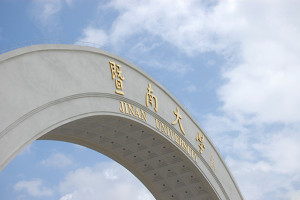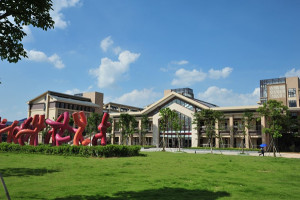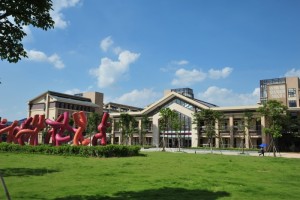The Institute for Environmental and Climate Research (ECI), Jinan University, Guangzhou, China
The 2nd Mini ACC-AQSM Symposium is set to take place on Tuesday, 3 July 2018 at The Institute for Environmental and Climate Research (ECI), Jinan University in Guangzhou, where we will continue working on addressing the seven Big Questions:
- From the past to the future: sources of air pollution in China.
- Children born to cleaner air over China are healthier.
- Severe urban air pollution episodes: can we prevent them?
- Ozone: the growing treat and how to control it?
- Sensors: the technology of the future or a passing trend?
- Indoor air: a neglected element in the puzzle of the quest for clean air
- The dawn of the new reality: clean air over China?
This mini symposium will build on and extend the work of the mini symposium held in Beijing last month, and will provide an opportunity for more members to participate. Everyone is invited and for more information, please contact Ms. Chantal Labbe (chantal.labbe@qut.edu.au) or Dr. Hao Wang (haowang201314@126.com).
About the Jinan University
The Jinan University, established in 1906, is the first national university and jointly constructed by Overseas Chinese Affairs Office  of the State Council, Ministry of Education of the People’s Republic of China and Guangdong Province. It is also the first Chinese university to enrol Chinese and foreign students. With the largest number of overseas students on campus, the Jinan University enjoys a well-earned reputation as the paramount academy for overseas Chinese and is one of the top 100 universities under the key Construction Project of the 21st Century of China.
of the State Council, Ministry of Education of the People’s Republic of China and Guangdong Province. It is also the first Chinese university to enrol Chinese and foreign students. With the largest number of overseas students on campus, the Jinan University enjoys a well-earned reputation as the paramount academy for overseas Chinese and is one of the top 100 universities under the key Construction Project of the 21st Century of China.
The Institute for Environment and Climate Research (ECI) was founded in May 2016, and conducts original research with the overarching goal of understanding the major characteristics and controlling processes and investigation if mitigation technologies of air pollution and climate change. Findings of ECI’s research can contribute significantly to environmental and climate change sciences, more importantly, the research outcomes can benefit the people and the society substantially.
The ECI currently has four major research domains: namely observation, assessment and mitigation of atmospheric environment; environmental impacts on human health; chemistry of air pollution; and climate change focusing on clouds and precipitation.
The ECI has 46 members at present, including 10 professors, 5 associate professors, 1 distinguished associate researcher, 6 assistant professors, 5 postdoctoral researchers, 8 laboratory and administrative staffs, 11 research assistants, and 5 guest professors. There is one Academician, one “Ten Thousand Scientific Leade r Awards” winner, three “Outstanding Young Scientist Awards” winners, and a number of other academic award winners. Among these faculty, 11 are accepting PhD students and 17 are accepting Master students. The ECI offers Master and PhD degrees in Ecology, Environmental Sciences, Environmental Sciences and Environmental Engineering, and Environmental Engineering. Faculty members of ECI currently carry out 16 nationally and province funded major research projects. In addition, there are 18 research and operational projects funded by urban governments. The annual total research funding from these funding agencies exceed 70 million.
r Awards” winner, three “Outstanding Young Scientist Awards” winners, and a number of other academic award winners. Among these faculty, 11 are accepting PhD students and 17 are accepting Master students. The ECI offers Master and PhD degrees in Ecology, Environmental Sciences, Environmental Sciences and Environmental Engineering, and Environmental Engineering. Faculty members of ECI currently carry out 16 nationally and province funded major research projects. In addition, there are 18 research and operational projects funded by urban governments. The annual total research funding from these funding agencies exceed 70 million.
The ECI collaborates with universities and research institutes worldwide. For instance, ECI has close ties in research with University of California, Berkeley, Max Planck Institute, Queensland University of Technology, Hong Kong Polytechnic University, Tsinghua University, Peking University and Guangzhou Institute of Geochemistry from Chinese Academy of Sciences. The ECI has also co-established research laboratories with many universities and institutes for sharing academic resources and research facilities. With these collaborations, students can benefit from a wider picture of global scientific researches.
In April 2018, the JNU-QUT Joint Laboratory for Air Quality Science and Management was unveiled and the JNU-QUT Joint PhD Program Agreement was signed.

第二届小型ACC-AQSM研讨会将在中国广州暨南大学环境与气候研究所(ECI)举行
第二届小型 ACC-AQSM研讨会将在广州暨南大学环境与气候研究所(ECI)举行,我们将继续致力于解决七大问题:
- 从过去到未来:中国空气污染的来源。
- 在中国干净空气中出生的孩子更健康。
- 严重的城市大气污染事件:我们可以预防吗?
- 臭氧:越来越多的治理以及如何控制它?
- 传感器:未来的技术还是即将过去的趋势?
- 室内空气:在寻求清洁空气的难题中被忽视的元素
- 新现实的曙光:中国的干净空气
第二次小型研讨会将继续延续上个月在北京举行的小型研讨会的工作,并未更多成员参与提供机会
查看议程.查看议程
关于暨南大学
暨南大学成立于1906年,是国务院侨务办公室,中华人民共和国教育部和广东省共同建设的第一所国立大学。 它也是第一所招收中外学生的中国大学。 暨南大 学拥有最多的海外留学生,是海外华人最高学院,是中国21世纪重点建设项目的百强大学之一。
学拥有最多的海外留学生,是海外华人最高学院,是中国21世纪重点建设项目的百强大学之一。
环境与气候研究所(ECI)成立于2016年5月,开展独创性研究,其主要目标是了解主要特点和控制过程以及空气污染和气候变化减缓技术的调查。ECI研究的结果可以为环境和气候变化科学做出重大贡献,更重要的是,研究成果可以大大有益于人民和社会。
ECI目前有四个主要研究领域:大气环境的观测,评估和减缓;环境对人类健康的影响;空气污染化学;以云和降水为重点的气候变化。
ECI现有教职工46人,其中教授10人,副教授5人,副研究员1人,助理教授6人,博士后研究人员5人,实验室和行政人员8人,研究助理11人,客座教授5人。有一位院士,一位“万科学领袖奖”获得者,三位“杰出青年科学家奖”获奖者,以及其他一些学术奖获得者。在这些教师中,有11人接受博士生,17人接受硕士生。 ECI提供 生态学,环境科学,环境科学和环境工程以及环境工程硕士和博士学位。 ECI的教职员工目前正在执行16个国家和省资助的重大研究项目。此外,还有18个由城市政府资助的研究和运营项目。这些资助机构每年的总研究经费超过7000万。
生态学,环境科学,环境科学和环境工程以及环境工程硕士和博士学位。 ECI的教职员工目前正在执行16个国家和省资助的重大研究项目。此外,还有18个由城市政府资助的研究和运营项目。这些资助机构每年的总研究经费超过7000万。
ECI与全球的大学和研究机构合作。 例如,ECI与加州大学伯克利分校,马克斯普朗克研究所,昆士兰科技大学,香港理工大学,清华大学,北京大学和中国科学院广州地球化学研究所的研究密切相关。 ECI还与许多大学和研究所共同建立了研究实验室,以共享学术资源和研究设施。通过这些合作,学生可以从更广泛的全球科学研究中受益。
2018年4月,JNU-QUT空气质量科学与管理联合实验室揭晓,并签署了JNU-QUT联合博士项目协议。

